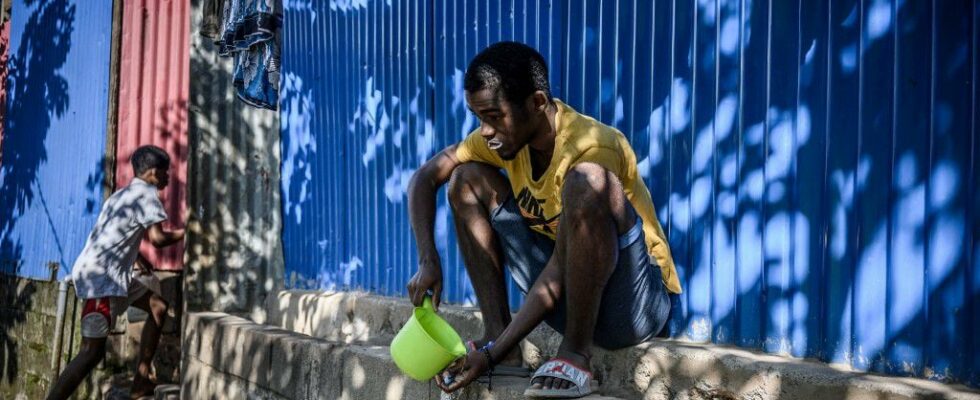On May 27, L’Express revealed significant health failures in Mayotte which favored the spread of cholera. Despite several alerts, no water was added in the department to prevent the spread of the disease. At least not in the place where the two epidemic outbreaks broke out, in the slums of M’Tsangamouji and Koungou, areas of illegal migrant housing that the State is currently trying to dismantle.
While this is one of the most important levers for fighting the disease, we had to wait for the two local epidemic outbreaks to develop, causing 122 sick people and two deaths to date, for ramps to be implemented. Additional water is added. These were only installed at the beginning of May, even though the risk had been known for weeks: the Comoros, a nearby country, saw the bacteria flare up from February. And from April 26, Public health France had publicly asked to “ensure and/or maintain at a minimum” access to water.
Since these revelations, based on two confidential reports addressed to the health authorities and obtained by L’Express, the situation has evolved. According to our information, an interministerial meeting involving the services of the Ministries of the Interior and of Health was convened on Wednesday May 29 to follow up on this media coverage. The next day, May 30, one of the two documents revealed by L’Express, the note from Covars (committee for monitoring and anticipation of health risks) has been made public. The Ministry of Health thus returned to its initial positions of not distributing this document which had been given to it.
A change of mind…
As we wrote, the note protests against the decision taken by the authorities not to improve access to water in these slums, despite not only good health sense, but also the law which, since 2022, requires providing everyone on French soil with minimum access to water. “The limitation of water access points which persists to this day [NDLR : à date du 7 mai 2024] is not defensible in the context of an epidemic of a water-borne disease such as cholera”, insisted Covars.
The note explains that because of these failings, “the impact of the very important work of the Regional Health Agency (ARS) and healthcare personnel to limit the spread of cholera and treat it is rendered derisory”. According to this work, the decision not to connect water to the slums, even temporarily, did not endanger the only inhabitants of these precarious neighborhoods, largely people in an irregular situation or in extreme poverty. She also exposed the entire department to the “continued spread of cholera”.
The Covars observation is part of a context where the establishment of water points comes up against blockages from a part of the population who see it as a “breathtaking opportunity” for illegal immigration. Arguments supported by anti-immigration citizen groups and by the far right, while, in the department, Marine Le Pen is leading the opinion polls. Many also believe that connecting water to slums, although made compulsory by law, would deprive French citizens of this resource, rare on the island due to droughts and poor management. The ARS has, however, reminded us on numerous occasions that this consumption is completely derisory.
…which justifies the health emergency
On May 21, a few days before the publication of L’Express, ARS Mayotte finally announced that it was working to provide additional water ramps. A promise also made by the Minister of Health, Frédéric Valletoux, who visited the site a little earlier in the month. So many guarantees which, until now, have not been enough to reassure. Many actors on site still fear that the State will stick to the strict minimum. For fear, according to these sources, that this water will perpetuate the slums and encourage immigration.
By making the Covars note public, the Ministry of Health can now argue that this is a health emergency. And not a backpedal compared to its “takeover of the department” operations, Wuambushu and Place Net XXL. Consisting of the multiplication of controls and destruction of illegal dwellings, these actions, although desired by the Mahorais, had the side effect of having contributed to the worsening of unsanitary conditions in certain places. Many families, for example, had to leave a location in the city center, connected to the water network, for a riverside location. The Kierson slum in particular saw its size double due to evictions. It was there, precisely, that the first source of cholera contamination was detected. Despite numerous imported cases each year, the bacteria, which mainly spreads in open gutters, has never managed to spread in France, including Mayotte, since 1892.
.
